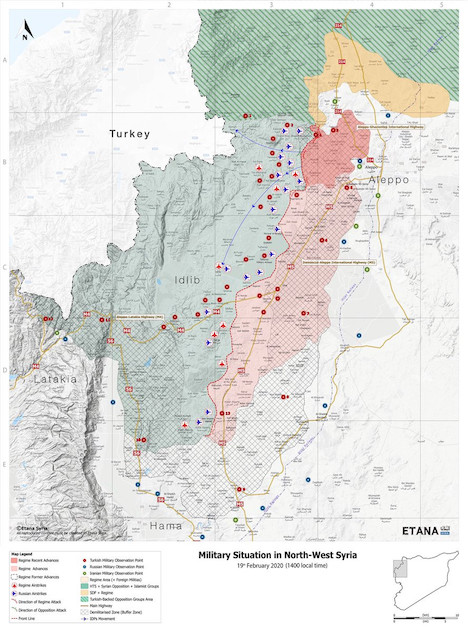| Russia has called Turkey's bluff of a wide ranging attack on Syrian government forces. The Turkish president Recep Tayyip Erdogan will now have to find a way out of the Idleb trap he set himself in. His excellent Syria adventure is coming to an end. Meanwhile we learn that the British military intelligence ran another large dis-information campaign that brought 'Syrian voices' into the 'western' press. Erdogan continues with his wild rhetoric over Syria. #ERDOGAN: "#Turkey cannot be confined within the 780,000 km2 border. #Misrata, #Aleppo, #Homs & #Hasaka are outside our actual borders, but they are within our emotional & physical limits, we will confront those who limit our history to only 90yrs."The Turkish talks with Russia have not gone well. Russia had proposed the following points:
Turkey rejected the Russian proposal: President Recep Tayyip Erdoğan said on Feb. 19 that talks with Russia on the northwestern Syrian region of Idlib were far from meeting Turkey's demands and warned that a military operation there was a "matter of time".Russia called a Turkish attack the worst case scenario: The Kremlin spokesman added that "if it is an operation against Syria’s legitimate authorities and armed forces, it will definitely be the worst scenario."Two hours after it published the above the Russian agency TASS also published this: Two Russian Tupolev Tu-22M3 strategic bombers have performed a scheduled flight over the neutral waters of the Black Sea, Russia’s Defense Ministry said in a statement on Wednesday.The Tu-22M3 can fire long range cruise missiles. The Turkish military will understand that warning. The Russians are also prodding Erdogan with reports about U.S. weapon deliveries to PKK-Kurds in east Syria: “The US command in the region is intensively saturating the territory east of the Euphrates river with weapons and ammunition. Since the beginning of 2020, 13 military convoys have arrived from Iraq to Syria, which included over 80 armored vehicles and more than 300 trucks loaded with various types of weapons, ammunition and materiel”, Rear Adm. Oleg Zhuravlev said in a daily briefing.Reports now speak of more than a million refugees in Idleb even as the pre-war population of Idleb governorate never exceeded 1.5 million. Many of those already fled during the early war either to government held areas or to Turkey and beyond. Where are the million reported now supposed to have come from? The 'western' media is again practicing tear jerking about these refugees in Idleb. But its reports forget to mention that al-Qaeda rules Idleb and that it prevents the people from crossing the line into Syrian government held areas: In yet another lengthy, expensive, lavishly illustrated story about Idlib, the NYT once again failed to make any mention of the politics of what is happening in that enclave of northwestern Syria– namely, the fact that well-armed jihadist/takfiri fighters from all around the world have controlled it for the past several years, while Syria’s government forces have been battling to regain control.Today we learn that many of these unverifiable sources have been on the British government payroll since at least 2012: A number of leaked documents seen by Middle East Eye show how the propaganda initiative began in 2012 and gathered pace the following year, shortly after the UK parliament refused to authorise British military action in Syria.These 'sources' which were hired and instructed by the UK government are the ones quoted in 'western' papers. The whole scheme, like the British organized 'White Helmets', was run by military intelligence officers: Individuals familiar with the project say that around nine companies were invited to bid for the contracts. They included a number of firms established by former British diplomats, intelligence officers and army officers.The British intelligence also hired journalists to write 'Syrian rebel' propaganda stories. Britain also organized and directed the opposition's spokespersons: Meanwhile, other leaked documents seen by MEE show that the British government had awarded contracts to communications companies, which selected and trained opposition spokespeople, ran press offices that operated 24 hours a day, and developed opposition social media accounts.It wasn't just UK media who cited those persons. The whole 'civil opposition movement' was, like the 'White Helmets', a well organized and paid British government front. But when Turkey increased its role in Syria the British dis-information operation began to shut down: British government enthusiasm for much of the work appears to have begun to wane as it became increasingly clear that the Assad government and its Russian and Iranian allies were winning the civil war, and funding for contracts began to dry up.That Turkey's government became less tolerant to the British operation may also explain the death of the British military intelligence officer who ran the 'White Helmets' propaganda group from his apartment in Istanbul. Source URL |
